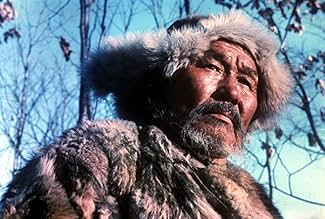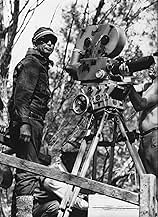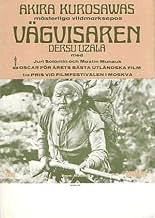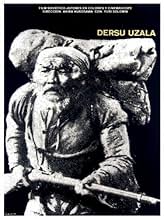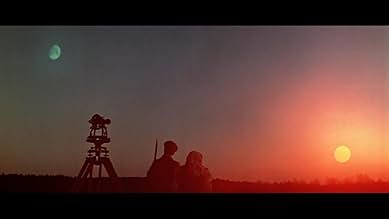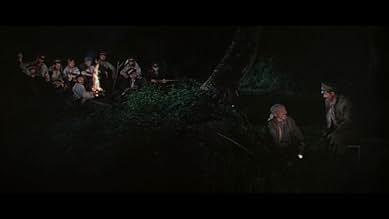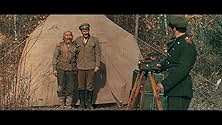VALUTAZIONE IMDb
8,2/10
35.251
LA TUA VALUTAZIONE
L'esercito russo invia un esploratore in spedizione nella nevosa e selvaggia steppa siberiana, dove egli diventa amico di un esperto cacciatore locale.L'esercito russo invia un esploratore in spedizione nella nevosa e selvaggia steppa siberiana, dove egli diventa amico di un esperto cacciatore locale.L'esercito russo invia un esploratore in spedizione nella nevosa e selvaggia steppa siberiana, dove egli diventa amico di un esperto cacciatore locale.
- Regia
- Sceneggiatura
- Star
- Vincitore di 1 Oscar
- 8 vittorie e 1 candidatura in totale
Mikhail Bychkov
- Otryad Arseneva
- (as M. Bychkov)
Vladimir Khrulyov
- Otryad Arseneva
- (as V. Khrulyov)
Stanislav Marin
- Otryad Arseneva
- (as S. Marin)
Igor Sykhra
- Otryad Arseneva
- (as I. Sykhra)
Vladimir Sergiyakov
- Otryad Arseneva
- (as V. Sergiyakov)
Yanis Yakobsons
- Otryad Arseneva
- (as Ya. Yakobsons)
Vladimir Khlestov
- Otryad Arseneva
- (as V. Khlestov)
Vladimir Sverba
- Otryad Arseneva
- (as V. Sverba)
Vladimir Kremena
- Turtygin
- (as V. Kremena)
Aleksandr Pyatkov
- Olenev
- (as A. Pyatkov)
Recensioni in evidenza
On the face of it, Dersu Uzala would not seem like a candidate for a great film. The story is about a young Russian (Imperial Russia) officer is sent to the far east of Siberia to explore. He meets with a native of the region and they form a bond together. The territory in question is the wild, rugged eastern Siberia (north of Valdivostok). I would say that you have not lived until you have seen what Kurosawa can do filming nature in its raw splendor and magnificence. The scenes in this film like the wind rushing through the tall reeds, or the mist draping the forested hills, are images of haunting beauty.
Kurosawa, one of the greatest film directors of the 20th century, made his final masterpiece with film. The characters are well drawn, the sub-text of the story (the clash of civilization vs. nature) is nuanced, but most of all it is the wild beauty of nature which is the focus of this film. Once you see it, I don't think you will forget it, I know I never have.
Kurosawa, one of the greatest film directors of the 20th century, made his final masterpiece with film. The characters are well drawn, the sub-text of the story (the clash of civilization vs. nature) is nuanced, but most of all it is the wild beauty of nature which is the focus of this film. Once you see it, I don't think you will forget it, I know I never have.
This 1975 joint Japanese-Russian film is a celebration of simple virtues, friendship, loyalty, love, and respect for nature. Based on the journals of the Tsarist explorer and surveyor, Captain Vladimir Arseniev, it is the story of the relationship between Captain Arseniev and an Asiatic hunter of the Goldi tribe named Dersu Uzala. With a love and understanding of the forest that is extraordinary, Dersu guides the Captain through several deadly encounters. He saves the Captain's life by building a shelter out of reeds during a ferocious wind storm. Maksim's performance as Dersu, the ancient woodsman, is very "Yoda-like": wonderous, dignified, and very natural.
The friendship between the two main characters grows over many years and several expeditions in the wild. Their relationship is beautifully developed and moves to an inevitable climax when Dersu and the Captain move back to the Captain's home in the city.
There is in this film a sense of the beauty, tranquility, and timelessness of nature. It takes place at a time in the early part of the last century when people had closer ties with nature and felt a kinship with animals, plants, and the elements. Dersu endearingly refers to all elements of nature including the river, the wind, the trees, and the animals as "men". As the English writer, Hugh Trevor-Roper said of Shakespeare so it is true of Dersu, "He sees mankind almost as part of nature, sometimes basking in a delightful, smiling Nature; sometimes caught up in a fierce, cruel, inexorable, insatiable Nature".
I was totally absorbed in this film and in its regard for the essential goodness of man and the beauty of the natural world. Dersu Uzala is a great film from one of the all-time masters.
The friendship between the two main characters grows over many years and several expeditions in the wild. Their relationship is beautifully developed and moves to an inevitable climax when Dersu and the Captain move back to the Captain's home in the city.
There is in this film a sense of the beauty, tranquility, and timelessness of nature. It takes place at a time in the early part of the last century when people had closer ties with nature and felt a kinship with animals, plants, and the elements. Dersu endearingly refers to all elements of nature including the river, the wind, the trees, and the animals as "men". As the English writer, Hugh Trevor-Roper said of Shakespeare so it is true of Dersu, "He sees mankind almost as part of nature, sometimes basking in a delightful, smiling Nature; sometimes caught up in a fierce, cruel, inexorable, insatiable Nature".
I was totally absorbed in this film and in its regard for the essential goodness of man and the beauty of the natural world. Dersu Uzala is a great film from one of the all-time masters.
Akira Kurosawa was a masterful director and powerful storyteller, Dersu has always been my favourite of his films. It was also the first I saw - on Christmas Day afternoon 1978 on UK BBC2 - would that they were as adventurous nowadays! Since then of course I've seen all of his films from Stray Dog on, Rashomon and Ran being especial favourites, but I keep on coming back to watch this one, ostensibly the simplest tale Kurosawa ever filmed.
The understanding and bonding that develops between the two men Arseniev and Dersu is wonderful to see, and over two hours holds your attention with expertly observed minutiae of character and scenic interplay. The last ten minutes cover a lot of ground (no pun intended) but it's all so logical and sad that I always need to see the end credits to recover.
So many marvellous scenes: the tiger in the forest in the morning; the phlegmatic reclusive old Chinaman; the raft; wispy blue shaded smoke from night-fires; the conclusion of course; the view of those two great men, the Moon and the Sun in the same shot. Not everyone would like Dersu, their most likely comments being "boring" - but how wrong they are they'll never know!
A film not fit to lick Dersu Uzala's metaphorical boots (or even Plan 9 from Outer Space's for that matter), Blazing Saddles was filmed the same year in America and a generation on still gets more praise than this poetic masterpiece!
The understanding and bonding that develops between the two men Arseniev and Dersu is wonderful to see, and over two hours holds your attention with expertly observed minutiae of character and scenic interplay. The last ten minutes cover a lot of ground (no pun intended) but it's all so logical and sad that I always need to see the end credits to recover.
So many marvellous scenes: the tiger in the forest in the morning; the phlegmatic reclusive old Chinaman; the raft; wispy blue shaded smoke from night-fires; the conclusion of course; the view of those two great men, the Moon and the Sun in the same shot. Not everyone would like Dersu, their most likely comments being "boring" - but how wrong they are they'll never know!
A film not fit to lick Dersu Uzala's metaphorical boots (or even Plan 9 from Outer Space's for that matter), Blazing Saddles was filmed the same year in America and a generation on still gets more praise than this poetic masterpiece!
It's 1902. Russian army explorer Captain Arseniev leads an expedition into the Siberian wilderness. They encounter local native hunter Dersu Uzala and recruit him as their guide.
It's a Soviet film made by the legendary Japanese filmmaker Akira Kurosawa. I'm not sure how that happened. Quite frankly, I watched the first hour without knowing about Kurosawa and was going to write that this is the best filmmaking out of the Soviet Union. The movie is over two hours and it does need to find a road map for their journey. I'm not saying that it lacks direction. It has an emotional direction. It's about the two men's relationship. I would like for more scenes of the two of them alone. They should have more heart to heart dialogue. Dersu is a great character. For example, I love the grass shelter and the two men are alone in survival mode. I'm also surprised by the tiger. The second half holds some interesting surprises. This is an interesting page in a legend's work. It won an Oscar.
It's a Soviet film made by the legendary Japanese filmmaker Akira Kurosawa. I'm not sure how that happened. Quite frankly, I watched the first hour without knowing about Kurosawa and was going to write that this is the best filmmaking out of the Soviet Union. The movie is over two hours and it does need to find a road map for their journey. I'm not saying that it lacks direction. It has an emotional direction. It's about the two men's relationship. I would like for more scenes of the two of them alone. They should have more heart to heart dialogue. Dersu is a great character. For example, I love the grass shelter and the two men are alone in survival mode. I'm also surprised by the tiger. The second half holds some interesting surprises. This is an interesting page in a legend's work. It won an Oscar.
9vdg
..and his name was Akira Kurosawa. Once upon a time there was a simple man: a hunter, and simple story of friendship and reflection about life. Once upon a time a magnificent director and film crew have put a beautiful story on the screen with such perfection, that in our days we look back and we wonder: why movies like this are not being made anymore??
It doesn't matter if you like any other Kurosawa's works or any other 'Russian' films, because this one would touch you so much that you would go back and looked for similar films I wish I could see this film in all his beauty: on a big screen, in the original format (70 mm), as I felt that I missed a lot of details from the TV format.
There are directors and there is Kurosawa, there are dramas and there are Russian stories, so when you put both of them together, what do you get? Dersu Uzala!
Enjoy it, at least as much I did
It doesn't matter if you like any other Kurosawa's works or any other 'Russian' films, because this one would touch you so much that you would go back and looked for similar films I wish I could see this film in all his beauty: on a big screen, in the original format (70 mm), as I felt that I missed a lot of details from the TV format.
There are directors and there is Kurosawa, there are dramas and there are Russian stories, so when you put both of them together, what do you get? Dersu Uzala!
Enjoy it, at least as much I did
Lo sapevi?
- QuizAkira Kurosawa had hoped to make this film as early as in the 1950s, but he had trouble adapting the story to a Japanese setting, never thinking that one day he would actually be able to film it on location in Russia, and with Russian actors.
- BlooperWhen Dersu and Arsenev are looking at the 3/4 moon and the setting sun, the moon is in the wrong phase to appear in the sky at the same time as the sun.
- Citazioni
Dersu Uzala: How can people live in a box?
- ConnessioniFeatured in For the Love of Movies: The Story of American Film Criticism (2009)
I più visti
Accedi per valutare e creare un elenco di titoli salvati per ottenere consigli personalizzati
- How long is Dersu Uzala?Powered by Alexa
Dettagli
- Data di uscita
- Paesi di origine
- Sito ufficiale
- Lingue
- Celebre anche come
- Dersu Uzala
- Luoghi delle riprese
- Aziende produttrici
- Vedi altri crediti dell’azienda su IMDbPro
Botteghino
- Budget
- 4.000.000 USD (previsto)
- Lordo in tutto il mondo
- 14.480 USD
- Tempo di esecuzione2 ore 14 minuti
- Colore
- Proporzioni
- 2.20 : 1
Contribuisci a questa pagina
Suggerisci una modifica o aggiungi i contenuti mancanti

Divario superiore
By what name was Dersu Uzala - Il piccolo uomo delle grandi pianure (1975) officially released in Canada in English?
Rispondi

